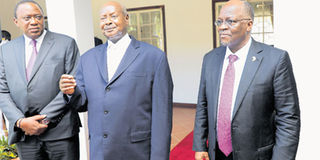Concern as presidents call off EAC summit

What you need to know:
The bungled 20th East African Community (EAC) Heads of State Summit left many bewildered on the state of the regional integration.
Arusha. Questions were being asked yesterday on the state of East Africa Community (EAC) integration following an unprecedented decision to call off a summit of the Heads of State from member countries.
Hundreds of delegates, including bureaucrats from the five countries and foreign representatives attending the summit in Arusha were left bewildered when news of the cancellation reached them.
Most of the attendees were apparently caught unawares and those interviewed expressed surprise about the matter, with some delegates calling for a review of the EAC treaty to avoid situations like this which they see as an embarrassment.
It was the first time that a summit of the Heads of State was called off at the venue while the move exposed a glaring and costly organisational weakness.
On record, it was announced that a quorum hitch because of Burundi’s absence forced cancellation of the summit, but rumours behind the scenes suggest there could be more than meets the eye as far as happenings at the regional bloc is concerned.
It will not be lost on regional integration watchers that yesterday’s meeting was coming amid mounting trade disputes between the key member countries of Tanzania, Kenya and Uganda. Political fault lines have also been reported recently between Rwanda and Burundi and Rwanda and Uganda, even though there was no firm confirmation how these factors could have played out.
Presidents John Magufuli (Tanzania), Uhuru Kenyatta (Kenya) and Yoweri Museveni (Uganda) who was the summit chair were already at the Arusha International Conference Centre (AICC) when the bombshell that the meeting would not take place dropped. “In the absence of Burundi, the summit will not take place due to lack of quorum”, the chairperson of the EAC Council of Ministers Kirunda Kivejinja told the members waiting for the leaders in the auditorium.
He said in a terse statement that the ‘postponed’ meeting of the Heads of State would be convened at a later date.
Mr Kivejinja, who is Uganda’s minister for EAC Affairs, said the rules and procedures of the summit require a quorum of all the partner states.
Besides the huge resources spent to prepare the summit, the cancellation would also add pressure to an already funds starved EAC secretariat. “We need to amend the Treaty so that there is not a repeat of such a thing,” said Dr Ali-Said Matano, the executive secretary of the Lake Victoria Basin Commission, an institution of the EAC.
He suggested the Treaty be amended so that if a half or three quarters of the countries agree on a key issue, that should be taken to be the decision of the bloc.
He noted that failure to organize the summit after preparations which took months was enough signal that not all was well in coordination.
The decision to postpone the summit was arrived at by the three presidents and ministers who represented Rwanda and South Sudan. Rwanda was represented by its Foreign Affairs minister Richard Sezibera, who is the immediate former EAC secretary general while Juba was represented by Trade minister Paul Aketch.
Mr Moses Kanyesingye, a trade policy analyst who was at the venue, said a lot of taxpayers’ money had been wasted. He noted he was worried EAC was going back to 1977 when the organisation broke up due to differences among the three partner states.
He hinted there may have not been enough consultations between the Office of the EAC Chair, the Secretariat and Burundi over the organization of the bungled summit.
The minister for Foreign Affairs and East African integration Augustine Mahiga confessed he was not “fully aware” as to why Burundi failed to turn up at yesterday’s summit.
However, he admitted he knew from the beginning the problems EAC was to encounter after noticing the absence of Burundi delegates in the pre-summit meetings. Peter Mathuki, the newly appointed executive director of the East African Business Council (EABC) said yesterday’s drama at the AICC was a blow to the business fraternity.
EAC officials, some apparently bewildered by the cancellation of the summit, were mum as to when the next event would take place. Reasons for the absence of Burundi at the summit and its preceding meetings of ministers and senior officials have not been clear.
However, impeccable sources established that the Bujumbura authorities had lately pressed on President Museveni to postpone the summit until a later date.
This was flatly rejected by the Ugandan leader who through Mr Kivejinja directed the secretary general to go ahead with the summit preparations.
It was not clear therefore if President Museveni knew beforehand that if Burundi failed to show up, the summit will be called off.



